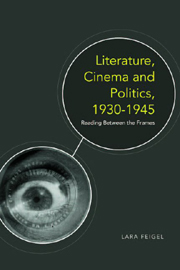Book contents
- Frontmatter
- Contents
- Acknowledgements
- List of Figures
- Introduction
- 1 Radical Cinema
- 2 Mass Observing: The 1930s Documentary Gaze
- 3 The Documentary Movement and Mass Leisure, 1930–1945
- 4 Camera Consciousness
- 5 Framing History: Virginia Woolf and the Politicisation of Aesthetics
- 6 ‘The savage and austere light of a burning world’: The Cinematic Blitz
- Afterword
- Endnotes
- Bibliography
- Index
Introduction
Published online by Cambridge University Press: 12 September 2012
- Frontmatter
- Contents
- Acknowledgements
- List of Figures
- Introduction
- 1 Radical Cinema
- 2 Mass Observing: The 1930s Documentary Gaze
- 3 The Documentary Movement and Mass Leisure, 1930–1945
- 4 Camera Consciousness
- 5 Framing History: Virginia Woolf and the Politicisation of Aesthetics
- 6 ‘The savage and austere light of a burning world’: The Cinematic Blitz
- Afterword
- Endnotes
- Bibliography
- Index
Summary
‘The influence of the films’
The 1930s was a decade as black and white as it was red. When left-wing writers were not observing the working classes in the north of England or fighting on their behalf in Spain, they were side by side with them in the picture palaces, glorying in the black-and-white shadows projected onto the flickering screen. Often, as with Christopher Isherwood, who took a turn as a camera while frequenting the Berlin slums, the two went together. Isherwood, W. H. Auden and Stephen Spender brought home from Berlin a commitment to socialism and a love of avant-garde German and Russian film. Both passions fitted comfortably into late 1930s London, home of May Day demonstrations, vehement anti-fascism and one of the most enthusiastic cinema-going publics in Europe.
It was also a decade of movement. While George Orwell rushed from Paris to London to Wigan to Spain, Auden was dashing round Berlin, Iceland and China, furiously snapping his Leica camera along the way. J. B. Priestley covered the whole of England, and crew from the people-watching group Mass-Observation followed the Bolton workers to the seaside to dizzy themselves on the rollercoaster. Wherever they were, 1930s writers were accompanied by the rhythm of the cinema, which defined and was defined by the rhythm of the modern metropolis. For the intellectual Left, the movement of this popular art form came to seem symbolic of its power to shock.
- Type
- Chapter
- Information
- Literature Cinema and Politics 1930–1945Reading Between the Frames, pp. 1 - 16Publisher: Edinburgh University PressPrint publication year: 2010



